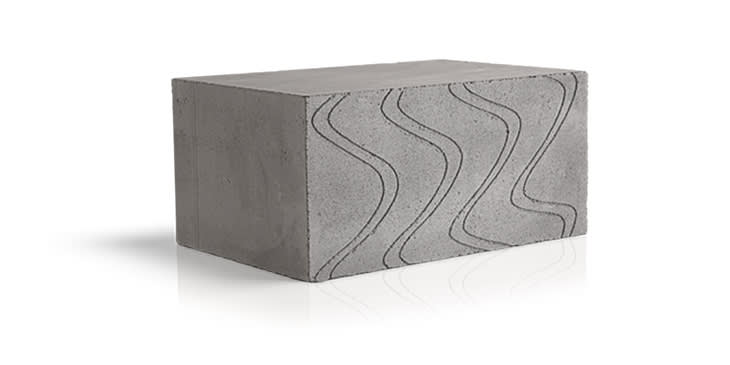Thermalite Blocks
(6 Products)Thermalite blocks offer light weight and thermal efficiency in a wide range of structural and non-structural applications. From cavity walls to partitions, extensions to foundations, it’s a material that’s as easy to work with as it is dependable on site.
What Are Thermalite Blocks?
Thermalite means lightweight thermal performance, and that’s exactly what these blocks deliver. These blocks are made from aerated concrete - a mixture that includes:
- Pulverised Fuel Ash (PFA) - a recycled fine ash from coal-fired power stations
- Cement - the binder holding everything together
- Lime - which reacts with the other ingredients during curing
- Aluminium Powder - this creates tiny gas bubbles during the mix
- Water - used to bind and activate the components
Once combined, the mix undergoes a reaction that forms millions of microscopic air pockets. This internal makeup sits at the centre of the block’s thermal and acoustic properties. The blocks are then steam-cured in autoclaves (a process which locks in strength without adding excess weight).
Understanding the Name: Thermal + Lite
The name Thermalite isn’t just branding - it directly reflects the block’s key advantages:
“Thermal” points to their ability to hold onto heat, making them ideal for improving a building’s energy performance.
“Lite” refers to their low weight. Compared to traditional concrete blocks, these are far easier to lift, move, and work with on-site. This low density really makes a difference when you're laying block after block.
Together, the name reflects what the product does: lightweight blocks that help control temperature.
Applications
Thermalite blocks are used throughout the building envelope and interior structure. Common applications include:
- Inner leaf of cavity walls
- Internal loadbearing and non-loadbearing partitions
- Separating walls between dwellings
- Foundation walls (below DPC), depending on specification
- Fire-rated and sound-insulated walls in residential and commercial buildings
Builders and contractors often favour Thermalite where speed, compliance with Part L, or ease of handling is a priority.
Benefits
- Thermal Efficiency: The closed air pockets in each block reduce heat transfer, helping buildings meet insulation targets with fewer additional materials. This improves energy ratings and supports building regulation compliance.
- Ease of Handling: Due to their reduced weight, Thermalite blocks are quicker and easier to lay than dense blocks. Their light weight speeds up manual work, which is especially useful on upper floors or in restricted-access areas where cranes or mechanical lifts aren’t an option. For small sites in tight urban settings, that often makes a significant difference to timelines.
- Fire Safety: Because they’re made from aerated concrete, Thermalite blocks don’t burn. In fact, they provide fire resistance of up to four hours when used as part of a compliant wall build-up. That makes them a strong choice for separating walls in flats, housing developments, and anywhere else that fire compartmentation is a requirement.
- Easy to Work With: From a tradesperson’s perspective, one of the more appreciated features is how workable these blocks are. They can be cut to size or chased for pipework using hand tools - no specialist equipment needed. That means less time spent adjusting and more time progressing the build.
- Reducing Sound Transfer: Air-filled structure helps absorb airborne sound. Used in internal partitions or party walls, they contribute to better acoustic separation between rooms or dwellings — which is becoming an increasingly common requirement in both residential and commercial projects.
- A Lower-Impact Option: Thermalite blocks are manufactured using recycled materials such as pulverised fuel ash (PFA), which reduces the environmental footprint of the product. On top of that, their thermal performance helps buildings use less energy over time - something that supports long-term sustainability goals and lower running costs.
Finding the Right Block for the Job
Not all Thermalite blocks are the same. Some are made for general-purpose walling; others are engineered for load-bearing use or to handle moisture in below-ground applications. Choosing the right type depends on where and how the block will be used.
Frequently Asked Thermalite Blocks Questions
What Are The Scratch Marks On Thermalite Blocks?
Thermalite has implemented a revolutionary feature to help you quickly and accurately recognise each block's technical specifications: the scratch mark.
This exclusive trait of Thermalite is especially advantageous when constructing your project as it helps you to distinguish the performance of the block at a glance. The performance can be determined by the number of scratches present on the block.
We stock an extensive range of Thermalite blocks to accommodate all of your building needs.
What Is The Most Thermally Efficient Block in The Thermalite Range?
Turbo block, the most thermal efficient member of Thermalite's product family, makes it an ideal solution for two-storey external walling needs that have low U-value requirements.
What Does Aircrete Mean?
Aircrete blocks often referred to as aerated blocks, are one of the lightest forms of concrete that offer many benefits including exceptional structural, thermal, sound, fire, and freeze/thaw properties.
Aerated concrete blocks have been used in the UK since the 1950s and are made of pulverised fuel ash (PFA), sand, cement, aluminium powder, lime, and water.
What Are Mortar Perpends/Perps?
The term "perpends" comes from old English and refers to the head or vertical mortar joints in bricks. Unlike horizontal bed joints, which are easier to fill, head joints require proper butting to prevent gaps in the wall system.
What Makes AAC Block Wall Masonry More Cost-effective Than Brick Wall Masonry?
The standard AAC block is 9 times larger than traditional brick, resulting in fewer joints and reducing the amount of cement needed.
AAC blocks are factory-made, providing a smoother finish and more precise specifications. Additionally, the larger size and lighter weight of AAC blocks make transportation and construction faster, while also reducing labour costs.

.jpg)


.jpg)